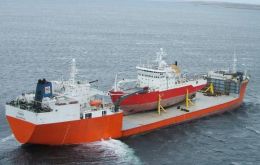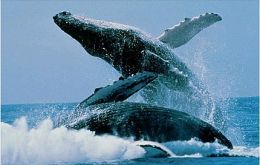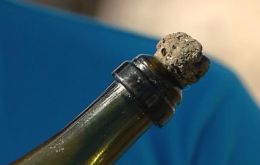MercoPress. South Atlantic News Agency
Environment
-
Saturday, September 11th 2010 - 23:02 UTC
Twenty tons of drilling shafts trucked 4.100 km to help rescue Chilean miners

Three trucks transporting special shafts for drilling equipment to be used in the rescue of the 33 miners trapped 700 metres underground in northern Chile, left from Punta Arenas in the extreme south of Chile.
-
Friday, September 10th 2010 - 03:28 UTC
Invasive “killer shrimp” discovered at water reservoirs in England

A killer shrimp has been found for the first time in the UK at an Anglian Water reservoir in Cambridgeshire, England. Two anglers spotted the shrimp, which can be as small as three mm, at Grafham Water near St Neots on Friday September 3 and sent samples to the Environment Agency for identification.
-
Wednesday, September 8th 2010 - 23:25 UTC
HMS Endurance to be replaced with vessel from Norway early 2011

Senior Royal Navy sources have confirmed a vessel from Norway will join the fleet early next year to replace Endurance, which almost sank in 2008, reports The News from Portsmouth.
-
Friday, September 3rd 2010 - 14:27 UTC
Humpback whales in Chilean sanctuaries to be tracked with GPS

Starting December, scientists from Chile’s Biomar Foundation will use GPS (Global Positioning System) to follow the movements of humpback whales in protected marine area Francisco Coloane, in the Magellan Strait. The whales are to be monitored for 12 months.
-
Friday, September 3rd 2010 - 03:14 UTC
New York skyscrapers “lights-out” project to protect migratory

A growing number of New York sky-scrapers are switching off their lights to help reduce the number of birds hitting the high-rise buildings. The “lights out” project - organised by NYC Audubon - runs until 1 November, when migratory birds are expected to have completed their autumn migrations.
-
Thursday, September 2nd 2010 - 20:15 UTC
Gulf of Mexico oil/gas production platform catches fire: “no spill” says operator

A well connected to an oil and gas production platform caught on fire in the Gulf of Mexico Thursday, engulfing the vessel in flames about 100 miles off the central coast of Louisiana and forcing 13 people overboard, Gov. Bobby Jindal said.
-
Thursday, September 2nd 2010 - 06:44 UTC
NASA experts: “hopelessness”, the worst enemy of trapped miners

A group of NASA specialists arrived Tuesday in Santiago to help the Chilean rescue team and Health and Mining ministers to assure a successful rescue mission for the 33 miners who have been trapped 700 meters underground since August 5.
-
Wednesday, September 1st 2010 - 18:54 UTC
Ascension Island conceals Darwin’s best kept secret: lush “Little England”

The lonely Ascension Island in the middle of the South Atlantic, and closely linked to the Falkland Islands (*) conceals Charles Darwin's best-kept secret. Two hundred years ago, it was a barren volcanic edifice. Today, its peaks are covered by lush tropical “cloud forest”.
-
Wednesday, September 1st 2010 - 06:13 UTC
World’s oldest drinkable champagne recovered from the Baltic Sea

Divers have salvaged 70 bottles of what may be the world's oldest drinkable champagne from a shipwreck in the Baltic Sea off Finland's Aland archipelago, Swedish media reports said.
-
Tuesday, August 31st 2010 - 05:10 UTC
Uruguay/Argentina implement the end of the pulp mill dispute

Argentina and Uruguay signed Monday in Montevideo the agreement which puts an end to an ongoing years-long litigation over the construction of a pulp mill along a shared river.
